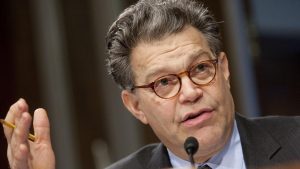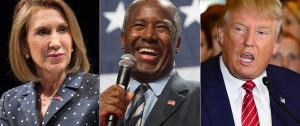By Ben Brockman
Approximately 3.5 million people tuned in on August 6 to watch the finale of one of the staples of American late night television, The Daily Show, a show which pioneered a new style of comedy and brought the news to a generation bored with the network standard. Whether or not you agree with his political views, you cannot marginalize the impact Jon Stewart has had on American politics. In 2014, a Pew Research Center study found that 12 percent of Americans cited Stewart as one of their main sources of news, roughly the same number as major news outlets like USA Today and The Huffington Post. The Daily Show has also given rise to two incredibly successful spin-offs: Comedy Central’s The Colbert Report and HBO’s Last Week Tonight, both hosted by former Stewart mentees. Is Stewart’s success purely a result of his hard work and dedication to his craft, or is it indicative of the rise of a new political landscape, a landscape in which comedians garner the respect of the electorate and could potentially be viewed as viable candidates for office? Although Stewart has never considered a run for office, the comedian-turned-politician is not without precedent. Just last year former Saturday Night Live cast member Al Franken was reelected to the Senate by the people of Minnesota. The humorist’s 2008 defeat of incumbent Norm Coleman, a career politician and lawyer, was significant because it represented the defeat of the establishment by someone who had built a career poking fun at it. At the time of his election, Al Franken was truly an outsider in a system controlled by career politicians like his opponent.

If the fast-approaching Republican primary is noteworthy for one reason, it is the success of “political outsider” candidates. Three out of the five highest polling candidates for the Republican nomination have one thing in common: they have no experience in government. Candidates like business magnate Donald Trump, neurosurgeon Ben Carson and former Hewlett-Packard CEO Carly Fiorina are gaining traction among potential voters at a time in which over 75 percent of Americans disapprove of the job being done by Congress. Meanwhile, scandals and accusations of corruption are derailing the campaign of presumed presidential front-runner Hillary Clinton, a candidate who many are starting to see as the personification of a broken system. In a poll conducted by Quinnipiac University, the words “liar,” “dishonest,” and “untrustworthy” topped the list of words used by voters to describe Clinton, a former first lady and secretary of state. The American voting public seems to be growing weary of the political establishment, and it is not alone. The rest of the world seems to be taking notice and, in Guatemala, they are taking action.
Political corruption in Latin America is a timeworn narrative. It is so widespread, that the leaders of Mexico, Chile and Argentina, three of the region’s largest nations, are currently embroiled in corruption scandals. It is no wonder then that the people of Guatemala are looking outside the box in their search for a new president, following the arrest of their last president Otto Molina on corruption charges earlier this month. The people of Guatemala have spoken and the results of the September 6 elections indicate they may have found their new leader in 46-year-old comedian Jimmy Morales. Morales won the popular vote with 24 percent of Guatemalans supporting him at the polls. Although he was not able to garner the 50 percent needed to win the election outright, these results are an indicator of good things to come for Morales in the October 25 run-off election, which will decide the next president.
Like Donald Trump, Ben Carson and Carly Fiorina, Morales is a conservative political outsider with no experience in government. He, like Trump, is running on a platform of nationalism, vowing on his website to “be the voice of my land being raped by foreign and private interests of its natural resources”. His most attractive quality to the Guatemalan electorate, however, is his stance against corruption. Morales ran under the slogan “not corrupt, not a thief,” promising to clean up the widespread corruption in the country’s government, corruption which was recently put on display for the world to see.

Like Stewart and Franken, Jimmy Morales is a career comedian and has garnered notable influence on his country’s young people. Much of this influence stems from the belief that these figures are not afraid to tackle the big issues facing their respective nations. Just like many Guatemalans see official corruption as the biggest problem plaguing their government, Americans are fed up with gridlock in Congress, an issue which Stewart has repeatedly tackled on his show. Although the Guatemalans are poised to elect a leader who claims to be able to solve this problem, the problem facing America requires a much more complicated solution. Gridlock is inherent in our de facto two-party system and the election of a “political outsider” candidate, like Trump, will likely do little or nothing to change that fact.
“[Morales] could accurately be described as the Guatemalan love child of an unholy union between Jon Stewart and Donald Trump”
There are still some potential stumbling blocks that Morales’ run-off opponent could use to prevent the comedian-turned-politician from occupying his nation’s highest office. Like Donald Trump, Jimmy Morales must contend with accusations of racism, which stem from his career as a television comic, during which he used black face routines and made jokes about indigenous Guatemalans. His party, the National Convergence Front, was founded by and is still supported by retired military leaders, who are stigmatized in Guatemala for their role in the abuse of citizens during the country’s civil war. Despite his baggage, things look to be on the up and up for Morales.
If he is elected next month, the man, who could accurately be described as the Guatemalan love child of an unholy union between Jon Stewart and Donald Trump, will be in the international spotlight. Could Morales be the answer to the problems that have plagued the people and the government of Guatemala for decades? Or is he simply a big personality capitalizing on strong anti-corruption sentiments for his own political gain? If he turns out to be the former, Morales could open the door for political outsiders, and even fellow comedians, in Latin America and even the United States to make the jump from headline grabbers to serious candidates. In the wake of the news of secret White House meetings between Jon Stewart and President Obama and a petition calling for Stewart to host a presidential debate reaching over 100,000 signatures, the idea of a comedian-president seems less and less funny.
Photo Credit: politicoscope
